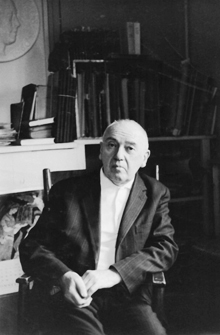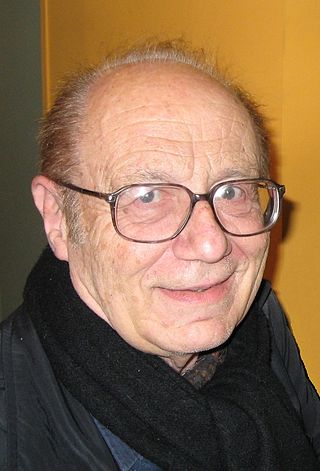
| French literature |
|---|
| by category |
| French literary history |
| French writers |
| Portals |
Richard Millet (born 1953) is a Lebanese-French author.

| French literature |
|---|
| by category |
| French literary history |
| French writers |
| Portals |
Richard Millet (born 1953) is a Lebanese-French author.
He was born in Viam, Corrèze in 1953. He spent part of his childhood in the neighborhood of Badaro in Beirut, Lebanon.
In 1994, he won the Essay Prize from the Académie Française for his book Le Sentiment de la langue (“The Feeling of Language”).
Several of Millet's novels are set in the village of Siom (Viam's literary counterpart), including La Gloire des Pythre (“The Glory of the Pythres”), L'Amour des trois sœurs Piale (“The Love of the Three Piale Sisters”), Lauve le pur (“Lauve the Pure”), and Ma vie parmi les ombres (“My Life Among the Shadows”). More generally, the Plateau de Millevaches - its landscape, climate, geographic location and the evolution of the lives of its inhabitants over the course of the century - is an essential element in his work, as Haute-Provence was for Giono, the county of Yoknapatawpha for Faulkner or Wessex for Thomas Hardy.
Millet mixes religious elements with coarse language, evoking the French Catholic tradition in a way that acknowledges the modern sexual revolution. Desire, suffering and evil are themes that permeate all of his work.
He is also an editor at Gallimard, where he played a decisive role in the publication of Jonathan Littell's novel Les Bienveillantes , which won the 2006 Prix Goncourt.
In 2005, he was with others authors as Alain Decaux, Frédéric Beigbeder and Jean-Pierre Thiollet one of the Beirut Book Fair's guests in the Beirut International Exhibition & Leisure Center, commonly (BIEL).
The September 2007 publication of Désenchantement de la littérature, in which he denounces the inanity of contemporary French literature and the loss of religious feeling in the West, generated a good deal of controversy. [1]
In July 2012, Millet published Éloge littéraire d'Anders Breivik, a condemnation of the actions of Anders Breivik and a critical exploration of his ideology, [2] as part of a collection of essays. In Éloge he asks why the Breivik case happened today, in Norway. He describes Breivik's victims as "mixed-raced, globalized, uncultivated, social-democrat petit bourgeois." [2] In the same essay, he also argues that the Norwegian massacre was the result of a weakened European identity, cultural decay, mass immigration and multiculturalism, and calls Breivik's mass murders "formal perfection ... in their literary dimension". [2] Referring to the controversy that followed, Millet stated "I'm one of the most hated French authors. It's an interesting position that makes me an exceptional being." [2] The book was condemned as a "fascist pamphlet" by the author Annie Ernaux. [3]
Despite the controversy, Millet continued to publish and in 2015 won the Prix de littérature André-Gide for his book Sibelius : Les Cygnes et le Silence.

The Prix Théophraste-Renaudot or Prix Renaudot is a French literary award.
Abdelkebir Khatibi was a prolific Moroccan literary critic, novelist, philosopher, playwright, poet, and sociologist. Affected in his late twenties by the rebellious spirit of 1960s counterculture, he challenged in his writings the social and political norms upon which the countries of the Maghreb region were constructed. His collection of essays Maghreb pluriel is one of his most notable works.
Marc Quaghebeur is a Belgian poet and essayist. He is director of the Archives and Museum of Literature in Brussels. He has a truly Belgian surname. It derives from Dutch Kwagebeur and has been adapted to the French spelling tradition.
Jacques Dupin was a French poet, art critic, and co-founder of the journal L'éphemère.
Pierre Bergounioux is a French writer. He won the 1986 Prix Alain-Fournier for his second novel, Ce pas et le suivant. And in 2002, he won the SGDL literary grand prize for his body of work.

Jules Roy was a French writer. "Prolific and polemical" Roy, born an Algerian pied noir and sent to a Roman Catholic seminary, used his experiences in the French colony and during his service in the Royal Air Force during the Second World War as inspiration for a number of his works. He began writing in 1946, while still serving in the military, and continued to publish fiction and historical works after his resignation in 1953 in protest of the First Indochina War. He was an outspoken critic of French colonialism and the Algerian War of Independence and later civil war, as well as a strongly religious man.

Jean Grenier was a French philosopher and writer. He taught for a time in Algiers, where he became a significant influence on the young Albert Camus.
Dominique Barbéris is a French novelist, author of literary studies and university professor, specializing in stylistics and writing workshops.

Jean-Marie Laclavetine is a French editor, writer and translator of Italian literature into French.
The prix Guillaume Apollinaire is a French poetry prize first awarded in 1941. It was named in honour of French writer Guillaume Apollinaire. It annually recognizes a collection of poems for its originality and modernity.

Alexandre Najjar is a Lebanese and French writer, lawyer, journalist and literary critic. He was born in Beirut and studied at Panthéon-Assas University and University of Paris 1 Pantheon-Sorbonne. He holds a Doctorate in Business administration and is specialized in banking and finance law. He is the author of more than 30 books translated into more than 12 languages. In addition to poetry and novels, he has written non fiction works like the biography of Khalil Gibran, the author of The Prophet., a book about the 1936 Summer Olympic Games in Nazi Germany and a book about the Arab Spring.

Philippe Rahmy was a Swiss poet and writer.
Margerit Robert was a French journalist and writer.
Jean Frémon is a French gallerist and writer. His written work spans and fuses genres, and contributed importantly to a trans-genre tendency in contemporary French letters. Working principally in the modes of ekphrasis, art criticism, literary commentary, narrative, and poetry, Frémon is perhaps unique in his fusion of late 20th century experimentalisms with the deeply rooted French tradition of belles lettres.
Roger Laporte was a 20th-century French writer.

Mohammed Aïssaoui is a French writer and journalist. He is currently working for Le Figaro littéraire.
Bernard Delvaille was a French poet, essayist, translator and anthologist.

Grégoire Polet is a Belgian writer and poet.

Pierre Bourgeade was a French man of letters, playwright, poet, writer, director, journalist, literary critic and photographer. A descendant of Jean Racine, he was also the brother-in-law of the writer Paule Constant.

Régine Detambel is a French writer. She was born in 1963. She published her first book in 1990, and has written prolifically ever since. Her works have been published primarily by Julliard, Le Seuil and Gallimard. She has won the Prix Anna de Noailles, the Alain Fournier Prize, and the Chevalier des Arts et des Lettres.